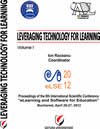THE IMPACT OF ECONOMIC PARADIGMS ON TEACHING BUSINESS ENGLISH
THE IMPACT OF ECONOMIC PARADIGMS ON TEACHING BUSINESS ENGLISH
Author(s): Elena MuseanuSubject(s): Education
Published by: Carol I National Defence University Publishing House
Keywords: Economic Terms; English; Learning; Paradigm; Teaching
Summary/Abstract: The paper focuses on the impact of economic paradigms on teaching business English. We made up paradigmatic methods beginning from a number of common traits, which are essentially in the meaning structure. Other distinctive traits are added to the above mentioned ones and the identification of these significant traits is needed for a proper definition, which is a very useful tool in the teaching process of the English business terms. The analyzed material showed that there is not easy to make the economic paradigms. Thus, in most definitions for the economic terms, one can notice the conceptual interference with other economic terms. This aspect hinders the identification of common and distinctive traits. The identification of the difficulties to divide the selected economic terms in lexicalsemantic paradigms has relevant variations (see ENTERPRISE, FIRM, COMPANY, CORPORATION or TITLE, BOND, SHARE). The semic analysis of the selected paradigms outlines the importance of the relation between the lexicographic and the terminographic definition to decode the specialized meaning and helps the teaching process in learning business English. In many cases we noticed the lexicographic definitions are not clear, because they offer insufficient dates. For this reason, sometimes general dictionaries are not recommended in teaching economic terms because they are not updated or the definitions lack a lot of important details about economic terms. Nevertheless, we noticed that in other dictionaries (DEXI, NDU) the definitions for the economic terms are close to the terminographic definitions because they contain not only relevant economic details but also necessary information for the teaching process and the students’ further understanding. On the other hand, the lexicographic definitions, unlike the terminographic ones, indicate the polisemy of the economic terms, thus warning the non-specialists on the risks of ambiguity.
Journal: Conference proceedings of »eLearning and Software for Education« (eLSE)
- Issue Year: 8/2012
- Issue No: 01
- Page Range: 248-253
- Page Count: 6
- Language: English

